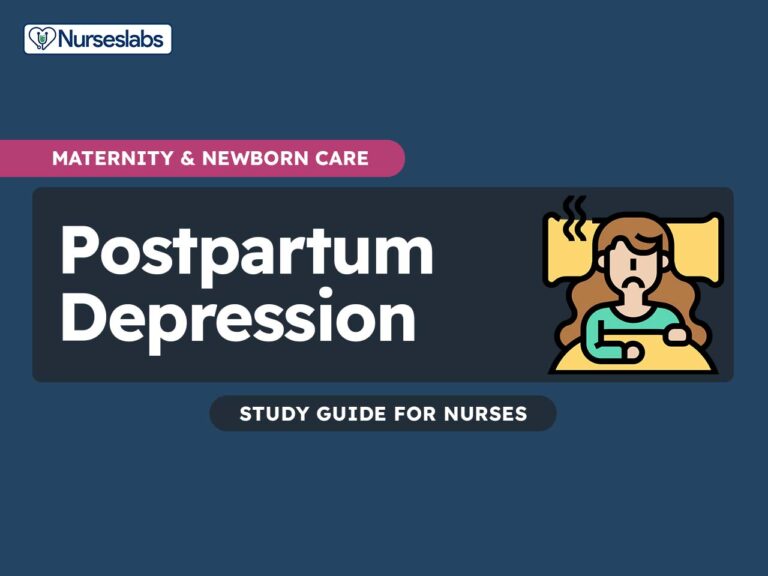The arrival of a new member of the family is a great change in a family. The postpartum period is typically characterized by immense joy and excitement as new mothers welcome their babies into the world. However, for some women, this period can also be accompanied by feelings of sadness, anxiety, and overwhelming emotions known as postpartum depression (PPD). As nursing professionals, understanding and addressing the complexities of postpartum depression is vital to providing comprehensive care and support for new mothers during this vulnerable phase of their lives.
This article aims to serve as a comprehensive nursing guide to postpartum depression, delving into its prevalence, risk factors, clinical manifestations, and evidence-based interventions.
Table of Contents
- What is Postpartum Depression?
- Pathophysiology
- Risk Factors
- Signs and Symptoms
- Medical Management
- Nursing Management
What is Postpartum Depression?
- A feeling of sadness that occurs for more than a year after the postpartum period and interferes with the normal functions of the mother is called postpartum depression (PPD).
Pathophysiology
- An anticlimactic feeling is experienced by the woman after birth.
- Hormonal changes in estrogen, progesterone, and gonadotropin-releasing hormone rises and falls.
Risk Factors
Depression is already a dangerous case for a patient, much more to a woman who has undergone a major change in her life. Taking note of these risk factors could prevent the development of this condition.
- History of depression. If the woman has already been diagnosed with depression before her pregnancy, the chance of its recurrence is possible after delivery.
- Low self-esteem. A woman with a low self-esteem may develop insecurities in making decisions and would be unwilling to be left alone with the infant.
- Stress at home and at work. The stress that the woman is experiencing would most likely develop into depression if it is left unresolved.
- Lack of support system. Emotional support is a great factor in the recovery of the woman from her postpartum blues. Without anyone to talk to and no one to support her, the woman may plunge deeper into depression.
Signs and Symptoms
The signs and symptoms of postpartum depression must be evaluated carefully to aid towards an accurate diagnosis.
- Overall feeling of sadness. This is very evident in postpartum depression, especially if it already affects the daily tasks of the woman.
- Extreme fatigue. The woman would only want to lie in bed all day because she is feeling very tired at all times.
- Inability to stop crying. Due to the intense sadness that the woman feels, she may only feel like crying all the time just to express her feelings.
- Increased anxiety. The woman is always overly anxious about her own and her baby’s health.
- The woman may feel insecure because of the lack of support system and she has no one to assist her in taking care of the infant.
Medical Management
A part of the care plan for a woman with postpartum depression is compliance of her medicines and other interventions that the physician sees fit to implement, and these are the following.
- Antidepressant therapy. This would be prescribed by the physician once the diagnosis of postpartum depression is determined.
- Counseling. Psychological counseling is recommended for a woman undergoing postpartum depression to let her express her feelings and restore her psychological health.
Nursing Management
Nurses must be alert in sensing the current psychological state of the patient too. They must provide a precise data of the patient’s well-being to give way to a more accurate care plan for a woman with postpartum depression.
Nursing Assessment
- Assess the woman’s psychological health even before the delivery.
- Assess her history of illnesses to determine if she needs any counseling prior to her delivery to avoid postpartum depression.
Nursing Diagnosis
- Impaired parenting related to the inability to perform activities of daily living secondary to postpartum depression.
Nursing Interventions
- Assist the woman in planning for her daily activities, such as her nutrition program, exercise, and sleep.
- Recommend support groups to the woman so she can have a system where she can share her feelings.
- Advise the woman to take some time for herself every day so she can have a break from her regular baby care.
- Encourage the woman to keep in touch with her social circle as they can also serve as her support system.
Evaluation
- The patient engages more in social activities.
- The patient can express her feelings and insecurities.
- The patient can perform her activities of daily living.
- The patient recognizes the importance of counseling and regularly attends one.
The psychological health of a mother has as much impact as well as her physical health. Her well-being must also be ensured because she is the number caregiver of the infant, and the bonding between mother and child would only be possible if both of them are in a state of good holistic health.

Thank you madam for this wonderful lecture note/writeup. I hope students and Registered Nurses globally will utilize as well as appreciate this lecture.
we do!
Thanks for being there for the nurses, please teach me more on how to do care plan